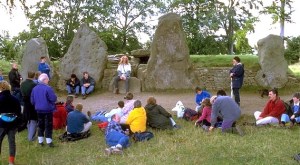Two brothers worked in apprenticeship to a blacksmith down at Yarrowfoot many, many years ago. They were hard working lads and good learners but after a while the youngest began to grow pale and thin, his previous ready wit and easy smile were gone from him along with his ability to concentrate and perform all but the simplest of tasks. He seemed distracted, tired and edgy.
One night, the elder brother sat down on the side of the younger’s bed as his brother lay there, with his eyes fixed somewhere beyond the roof.
“What is wrong my brother? Speak to me, maybe I can help”
“Help?” he replied “There is no help for me on this earth.”
“Well there certainly will not be if you don’t tell anyone what’s wrong! Now speak, for you know I will not let the matter drop until you do.”
So the lad told his tale, “Each night is the same, after everyone is asleep the Blacksmith’s wife comes in to our room. She slides a bridal over my head and I am transformed in to a horse. She then rides me for miles out across the moors, sparing neither kicks nor whips, places me in the stables of a great hall and goes within to dance and debauch with a host of other witches and their demonic associates. When they are done she collects me from my stall, in which there is neither food nor water, and rides me back here at full gallop, with just enough time to creep in to bed before I have to get up. I have not slept for days”
He said sadly. “Then swap beds with me now” urged his brother “and tonight you shall sleep while I bear your burden.”
The youngster needed no second asking and was fast asleep in his brother’s bed in a trice. There was not long to wait before the Blacksmith’s wife crept in to the room and slid the magic bridal over the elder brother’s head. He felt the strangeness of transformation, becoming a fine, strong stallion and allowed the witch to lead him out of the house. Soon he was galloping over the moors as she kicked his sides and whipped his back. Eventually they reached a great hall high up on the moors, where she placed him in a stable before going off to her ghastly revels.
The elder brother, whilst trying to scratch an itch on his cheek by rubbing it against the wooden side of the stall, discovered a nail sticking out of a post, managed to snag the bridal on it and pull it off over his elongated head. As soon as the bridal was removed he underwent a reverse of his previous transformation and hid in the shadows of the stall. When the witch returned from her unearthly carousing he suddenly leapt out and placed the bridal over her head, turning her in to a rather startled mare. Leaping upon her back he then rode her homeward across the moors, sparing neither kick nor whip and when he reached civilisation he made her gallop up and down a ploughed field until she was all of a lather. On the way he stopped at another forge and had the smith fit a fine set of horseshoes to her front hooves before completing the journey and releasing the blacksmith’s wife to slink, exhausted, in to her bed.
The honest blacksmith rose soon after and went to work but was concerned when his wife did not also rise. She claimed illness and a doctor was called who, seeing her pale and dishevelled state, wished to take her pulse but she refused to let him see her hands. Despite his entreaties she kept them beneath the bedclothes until he grew exasperated and pulled back the sheets. To their horror they saw the horseshoes attached to her hands and the bruises on her side. The brothers told their tale and the witch was duly punished in the time honoured fashion. The younger lad was nursed back to health with butter made from the milk of cows grazed in the churchyard, a sovereign remedy for those who have been hagridden.


